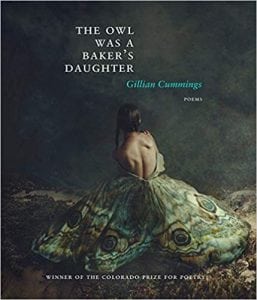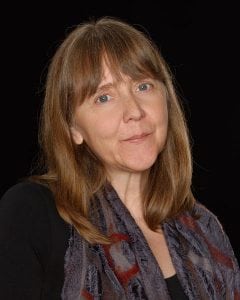Interview with Colorado Prize for Poetry Winner: Gillian Cummings
Gillian Cummings is the Author of The Owl was a Baker’s Daughter, winner of the 2018 Colorado Prize for Poetry selected by John Yau, forthcoming this November from The Center for Literary Publishing at Colorado State  University. I reached out to Gillian Cummings directly regarding her success, and she enthusiastically consented to an interview.
University. I reached out to Gillian Cummings directly regarding her success, and she enthusiastically consented to an interview.
About The Owl Was a Baker’s Daughter:
The title The Owl was a Baker’s Daughter originates from a line spoken by Shakespeare’s Ophelia in Hamlet whose grief and guilt at which point have overwhelmed her into a sort of psychosis. The Owl was a Baker’s Daughter harkens to a disempowered, grief-struck tragic female figure and muse. In four parts, the fragile narrator grapples with her own deteriorating mental state in a way that is both liquidly lyrical and powerfully melancholy to behold. Each poem offers an evocative examination of and attempted liberation from depression through several interwoven, extended and stunning nature representations. Water is invoked during many of these pleading pieces, an eerie foreshadowing of her death by drowning: “The speech of rain: it was only a matter / of something asking to be let in.” The Owl was a Baker’s  Daughter follows the profoundly wounded interior workings of a devastated, deranged character from her psychotic breaking point to that final point of departure—her suicide.
Daughter follows the profoundly wounded interior workings of a devastated, deranged character from her psychotic breaking point to that final point of departure—her suicide.
About the Poet:
Gillian Cummings is the author of The Owl Was a Baker’s Daughter, winner of the 2018 Colorado Prize for Poetry and My Dim Aviary, winner of the 2015 Hudson Prize (Black Lawrence Press, 2016). She has also written three chapbooks. Her poems have appeared in Barrow Street, Boulevard, The Cincinnati Review, the Colorado Review, Denver Quarterly, The Journal, The New Orleans Review, Verse Daily, in other journals and in two anthologies.
Here’s just a glimpse into the work:
Unwriting the Sentence
Nightly, it flaps out, flaps out—
not a cry but a quietness, it had become
bigger, empty of starlight. Sleep tucked it
far beneath a bed of wings and smoke-moon,
beneath the room rocking a slow tug
at her boatlessness. It would come for her.
Mornings, she knew this better than curtains
know to keep out light. She once feared
this would be more than she would ever know:
the book of pages left unturned, sullied
with some phantom coffee stains, underlines,
mostly the erasures. It was the erasures.
In the end, it was the erasures
of love that hurt most.
The owl was a baker’s daughter
If earth is oven enough for my father’s body, I won’t eat a cake that flies.
No, no, no—but night hears Who? as a question and cherry pies come
out feathered in silvers, golds. Brown at the throat where words turned
to molten syrup under crust—whose edges? Who? Where do we end? Ah,
stir us with no spoon but a knife, dirt is all our company. Would I were
the moon. Misted over and round as a chipped china plate. It’s late to
dine but too early for worms, so let me shine eerily upon you. I’ll enter
the hall quietly, slippered, my body gossamered white.
Moon-Girls of the Medicine
You were about to float away
so they taught you not to. Softly
into quiet they come, finely, into
spooked light—winged ones they bring,
goldfinch, marlin, wren in enormous
nest: the begin again, spring to startle
your winter out of sleep’s either you’ll wake
to wind that washes you like song or you’ll open
eyes on sky untrumpeted in old tempests of stars;
either you’ll come back to your body or you won’t.
But the girls hover over you with their grass-
messes of hair, their eyes mercy-mild, and what
the birds teach in such communal twig-
tangle is simple: how alone, we break;
how we’re saved by one another.
Gillian Cummings, “Unwriting the Sentence,” “The owl was a baker’s daughter,” and “Moon-Girls of the Medicine” from The Owl Was a Baker’s Daughter, published by THE CENTER FOR LITERARY PUBLISHING. Copyright © 2018 by Gillian Cummings. Reprinted by permission of THE CENTER FOR LITERARY PUBLISHING.
How does the Ophelia portrayed in this work relate to Shakespeare’s? Is a reader’s grasp of the Shakespearean backstory essential to understanding this work?
That’s a good question. All of the poems, from beginning to end, take as their subject the topic of suicide, suicidal ideation, and the life that can come back to one after an experience of coma, though of course Ophelia dies in Hamlet, as she also dies in this book.
This book is divided into four sections, the first and third sections being made up of short poems that were once all sonnets, and the second and fourth sections being taken from a sequence of prose poems I expressly wrote in a voice I imagined to be Ophelia’s. I think the poems that I will call for convenience the “once-sonnets” are easier for the reader to approach than the twelve prose poems, because they came out of my direct experience as someone who lived for over six years with suicidal depression.
The prose poems that take on the persona of Ophelia, these are a little different. In writing them, I read Hamlet over and over, I’d say about fifteen times. I wanted those poems to sound like Ophelia’s voice as Shakespeare had expressed it, only prismed through the crystal of a woman’s (my) consciousness. I think that with the prose poems, the reader may be able to experience the mind of a woman from the past who has experienced a profound and profoundly disturbing loss (Hamlet’s odd and often cruel behavior towards her that turns to an outright rejection of her love and then his mistaken murder of her father). But honestly, I do leave out the backstory, the scaffolding, so to speak, that is Shakespeare’s play. I let the reader imagine exactly what is going on, in part because I do want the experience to be disorienting, to feel like madness.
After the express privilege of reading your work, Keats’ idea of the chameleon poet, one that “has no identity, [who] is continually filling some other body” came to mind. In this work, that “other body” seems to be Ophelia. How does this process of distance from self-affect the writing process? How would you describe your own overall aesthetic?
I think that John Yau, who judged the Colorado Prize, had that same experience from reading these poems, that in my writing I inhabit other selves. And it’s true. It’s very hard for me to write as an “I.” It’s hard to even say “I,” if the “I” is really myself. So, I have developed a habit of speaking in persona poems or of writing as myself but using the pronoun “she” or “you” to create a necessary distance. I also make things up, fictionalize my life in poems, to further that distance. I think that there are some poems in this book that are so intensely personal that they still frighten me when I read them. One is the poem “Unwriting the Sentence.” I wrote that poem when I was very, very close to taking my life. It is my “Edge” poem and even quotes Plath. I tried to make it very, very quiet, eerily so. I think I may do these kinds of things in my writing because in life I’m a very shy person with a need for privacy in an increasingly publicly oriented society. And my mind may be more fractured than a normal person’s.
In tandem, Keats’ idea of negative capability, or “the artist’s access to truth without the pressure and framework of logic or science” feels simultaneously relevant. Through poetry and prose that evade straightforward sense, Ophelia’s voice proffers its own bent wisdom. How would you say this concept affects the reading experience of The Owl was a Baker’s Daughter and the reception of its inner logic?
As I said, I think that in the writing of this book, I was trying to create an experience for the reader that resembles the disorientation of madness. I hope that that comes across. I was also, in the third section of the book, the section that is more a coming back to life, trying to ground the poems in a deeply felt appreciation of the natural world, what remains of it, as a source of healing, a balm to the disturbed mind. I like your phrase “bent wisdom.” In The Owl, I lean upon and try to learn from certain Buddhist sutras that I incorporate obliquely. I never quite understood how to live the wisdom of Zen, though I studied under a Buddhist teacher for six years and took the Zen precepts called “Jukai” at the same time that I was starting to fall apart from several unbearably sad rifts in my life. Ophelia, as I saw and still see her, was inordinately wise in her madness, and the things Shakespeare had her say when she lost hold of her senses seemed to challenge even the patriarchal authority of King Claudius. I love that. And I love the beauty of her lack of logic. It’s “bent wisdom.” But it’s not so much my own as it is Shakespeare’s.
Your work My Dim Aviary (Black Lawrence Press, 2016), inhabits the voice of Miss Fernande—a Parisian model, prostitute, rumored mistress of Picasso. Observing the parallel explorations of the Damsel in Distress archetype, what draws you towards these subject matters and their musings?
The reasons for choosing both of these women as subjects may just come out of my life experience as someone who has a hard time seeing the side of life that is not tragic. I wrote in the voice of a sex-worker from a time past in My Dim Aviary because it was a way of my trying to heal myself from sexual abuse I suffered when I was young. I am someone who does not like sex and I thought that if I could imagine myself as someone comfortable in a very sexualized and even commodified body, I could face this terrible fear I have of not being safe as a woman. Sadly, for me, writing that first book did not help me at all with this problem. Nothing has so far… And then with the poems about Ophelia: I think she came so easily to mind simply because at the time I was obsessed with suicide, and she has long been one of my favorite Shakespeare characters.
One of the simplest ways people can promote poetry is by highly recommending other works. With that in mind, what poetry are you currently reading? Are there any poets, dead or alive, who you credit as your influences?
Thank you for asking this question. Certain poets’ works were central to the writing of this book, namely those of Cynthia Cruz, Allison Benis White, and Chloe Honum, who have written with great restraint about extreme states, not necessarily always their own. Also, Sylvia Plath, whose poetry has long been a touchstone for me, and Emily Dickinson. In recent years, I have loved—though not for that same kind of subject matter—Carolina Ebeid’s You Ask Me to Talk about the Interior, Ocean Vuong’s Night Sky with Exit Wounds, Jennifer Chang’s Some Say the Lark, and Kaveh Akbar’s Calling a Wolf a Wolf. There really are too many poets to name—I could go on and on. Most recently, I have turned to reading the Polish poets of the twentieth and twenty-first centuries, because I’m now working on a novel that takes place, partially, in Poland. And to speak of novels, not poetry, I feel a great debt to Virginia Woolf, who is always a great teacher for me.
When and where can one purchase your work?
The Owl Was a Baker’s Daughter has a release date of November 15, 2018. But it just went live for pre-sale orders.
It’s available through The University Press of Colorado’s website: https://upcolorado.com/university-press-of-colorado/item/3522-the-owl-was-a-baker-s-daughter.
And it’s also available through Amazon: https://www.amazon.com/Bakers-Daughter-Colorado-Prize-Poetry/dp/1885635656/
And, of course, you can order it at your local independent bookstore.








